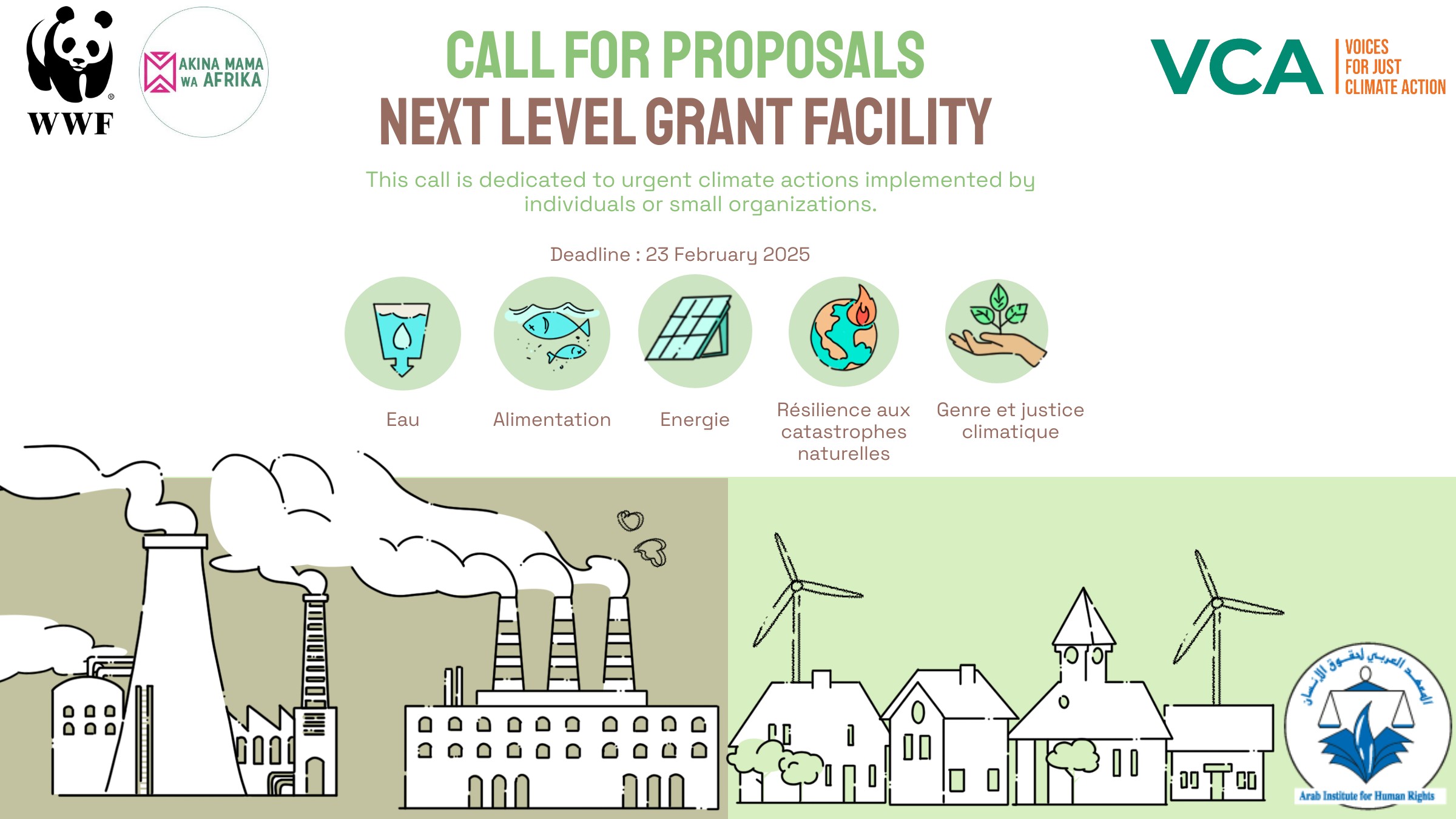Voices for Just Climate Action (VCA) Programme Next Level Grant Facility (NLGF) :
Call for proposals

• Context:
The Voices for Just Climate Action (VCA) Programme
The Voices for Climate Action (VCA) programme is a lobby and advocacy programme being implemented in seven countries by the World-Wide Fund for Nature (WWF) Netherlands, SouthSouthNorth (SSN), Akina Mama wa Afrika (AMwA), Slum Dwellers International (SDI), Fundación Avina and Hivos under the Dutch Ministry of Foreign Affairs’ five-year strategic partnership: “Power of Voices”. This programme is being implemented in Tunisia by the VCA alliance: AMwA, SSN, Hivos and WWF North Africa (WWF NA). The Voices for Climate Action (VCA) in Tunisia aims to ensure that by 2024, local civil society and marginalized groups will have taken on a central role as creators, facilitators and advocates of innovative and inclusive climate solutions. VCA supports locally shaped climate solutions through an inclusive and rights-based approach. The programme intends to see an expanded civic space where civil society voices, in particular those of vulnerable and/or marginalized people, are heard on climate action.
-
Background
Current financing systems are not designed to support small, informal groups and organizations efficiently. These groups often cannot meet the bureaucratic requirements set by donors, international funds and financial institutions.
The Next Level Grant Facility (NLGF) is a financing tool created within the framework of the VCA program and is managed by the Arab Institute of Human Rights in collaboration with the VCA alliance.
The NLGF aims to foster a bottom-up approach to decision-making, where local communities play a key role in identifying priorities and defining solutions. The facility is implemented by contracted local partners in the seven implementing countries of the VCA. These organizations work to expand civic space and work on the inclusion of voices of vulnerable and marginalized groups.
-
NLGF's primary objectives
The main purpose of the Next Level Grant Facility is to support on-the-ground climate actions that have a direct and tangible impact on the communities most affected by climate change.
Examples of actions supported under NLGF (this list is not exhaustive):
-
Supporting small organizations to attend any urgent meeting with the government and private sector business leaders, providing legal advice to communities affected by land conflicts, protecting persecuted environmental activists, funding campaigns, helping populations affected by natural disasters, or funding studies to produce evidence that supports specific positions.
-
Legal advice for communities affected by land conflicts (linked to harmful projects), protection of persecuted environmental activists.
-
Assistance to populations affected by natural disasters.
-
Funding studies to produce scientific evidence that supports specific positions, particularly urgent climate-related issues that require a rapid response. The study must lead to or transform into climate action benefiting communities most affected by climate change.
-
Rapid response to ensure the safety of human rights and environmental defenders.
-
Support in the form of equipment for local populations and groups most vulnerable to climate change or to enhance the safety of environmental activists, formal and informal associations.
-
Supporting Agricultural Development Groups (GDA), and Fishing Development Group (GDP)to ensure their adaptation to challenges caused by climate change.
-
Scope of the call
Call for proposal
The Arab Institute for Human Rights (AIHR), in collaboration with WWF North Africa and Akina Mama wa Afrika (AMwA), is coordinating the Next Level Grant Facility (NLGF) in Tunisia.
The AIHR is seeking initiatives, activities and action responding to immediate and urgent climate related needs and actions by targeting five key thematic areas; water, food, energy, and resilience to Natural hazards and gender and climate justice.
-
Water: Strengthening the resilience of marginalized groups to urgently respond to the impacts impacted of by floods and droughts and amplify locally led solutions to water scarcity and inadequate quality water supply etc.
-
Food: Ensuring food sovereignty and nutrition over the long term while sustaining the use of natural resources and ecosystems.
-
Energy: Improving energy and electricity security in Tunisia to meet the country's energy challenges.
-
Resilience to Natural hazards: Strengthening resilience and adaptive capacity to natural disasters intensified by climate change, including floods, forest fires, droughts, etc.
-
Gender and Climate Justice: Across the themes, contribute towards the gender justice efforts, centering the voices and collective power of gender.
These thematic areas will thus form the part of the VCA programme which is focused on advocacy while emphasizing a rights-based and intersectionality approach to amplify civil society voices in climate action and justice.
Grant Details :
The total grant per grant recipients must not exceed 10,000 Euros for small organizations.
The total grant per grant recipients must not exceed 5000 Euros for individuals.
The selection committee reserves the right to allocate the entire available amount, based on the action’s cost effectiveness.
The NLGF fund in Tunisia will run for a maximum period of 4 months in the period between April 1st to July 31st 2025.
During the fund period the grantee must:
-
Implement Urgent actions
-
Ensure the compliance of the administrative and financial procedures to the donor’s requirements.
-
Provide progress updates when needed.
-
Provide a final report at the completion of the action.
-
Beneficiaries of NLGF :
The beneficiaries of the NLGF have to be:
1) Small formal organizations that do not have the capacity to apply and report on more formal grants but that represent local right holders and work on local climate solutions.
Formal organizations : Non governmental organizations ( NGOs), Community based organizations (CBOs), Cooperatives, Social Entreprises …
Initial guidance on ”small” is organizations with yearly cash flow below 100,000 EUR/yr and with only few (partly) paid staff members.
2) Individuals: NLGF will also fund individuals. Environmental defenders, researchers, journalists, content creators ,Climate activists and local climate champions are not always acting on behalf of a (formal) organization, while threats to these individuals can be very serious.
V- Eligibility:
Who is Eligible to Apply?
Formal and informal organizations :
-
Must be operating in Tunisia.
-
Must have prior experience carrying out activities related to climate change
-
Must demonstrate the capacity to effectively implement and manage the proposed project.
-
Could be constituted of or working with marginalized groups (i.e., women groups, Youths), Agricultural Development Groups (GDA), and Fishing Development Group (GDP)
Individuals
-
Must be Tunisian citizens or residents.
-
Must demonstrate a commitment to local climate solutions.
-
Must have a clear plan for how the grant will be utilized to advance local climate initiatives and support for marginalized groups or those affected by climate change.
*** Governorates and region that didn’t priorly receive NLGF or VCA funds will be priviliged
VI- Selection Process :
Evaluation Process :
A Selection committee composed of representatives of AIHR, WWF NA and VCA alliance will evaluate the application based on an objective methodology including the contribution to the VCA Tunisia objectives, the severity of the addressed issue, the urgency, the applicant’s response capacity, the cost effectiveness, the action’s impact and the transparency and and accountability.
Selection Criteria
-Application is submitted within the Deadline.
-Evaluation of the action’s coherence with the VCA program and its impact, the action’s urgency and cost effectiveness.
-Proven experience of working in Climate Change and with marginalized groups.
Proposal details:
Send a proposal of maximum 12 pages detailing the following;
-
Organization/ individual background and structure (maximum 1 page)
-
Detailed history and experience in Climate Change Actions (maximum 2 pages)
-
Technical proposal describing the action (what issue does it address, how it will contribute to the VCA program objectives, the severity and urgency of the issue addressed by the action, the actions’s approach to solve the issue, the number of perceived beneficiaries, significant systemic changes, major policy changes etc…) (maximum 4 pages)
-
Detailed strategy on the capacity of managing the NLGF fund and delivering as proposed (control systems, human resources, material resources) ( maximum 2 pages)
-
An action plan and a timeline of the activities comprising the proposed climate action (maximum 2 pages)
-
At least 1 References in project implementation (maximum 1 page)
Requested Documents :
-Proposal of the action.
-Detailed budget (Please use this Proposal financial Template): https://shorturl.at/wA015
- Report/ portfolio of previous Climate Actions.
- Resume for applicants who are individuals.
- JORT for applicants that are formal organizations.
Timeline Date Item
February 7, 2025: Launch of the call for proposals.
February 23, 2025: Deadline for proposal submission.
February 24 – March 10, 2025: Evaluation of proposals.
March 10 – March 24, 2025: Notification of shortlisted candidates & interviews.
March 26, 2025: Notification of selected candidates.
March 30, 2025: Contract signing.
How to apply
Please submit your technical proposal and requested documents detailed in the Call for Proposals before February 23th, 2025 and send it to the following address: aihr.iadh@gmail.com and in copy to this email na.contact@wwfna.org, Mention ” NLGF- Call for Proposals ”

